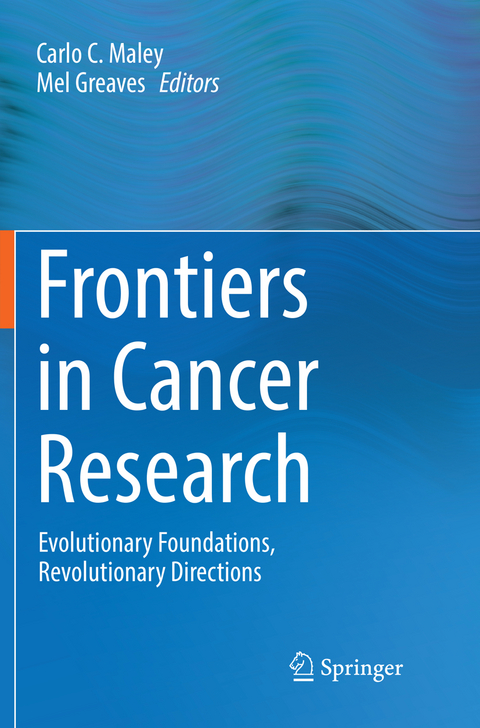
Frontiers in Cancer Research
Springer-Verlag New York Inc.
978-1-4939-8207-3 (ISBN)
This bookserves as a primer on the evolutionary and ecological theory of cancer- the framework upon which all the details of cancer may be hung. It is ideal for oncologists and cancer researchers interested in evolutionary theory, and evolutionary biologists and ecologists interested in gaining insights into cancer development and prevention.
Dr. Carlo C. Maley is an associate professor in the Biodesign Institute and the School of Life Sciences at Arizona State University. He is also the director of the Center of Evolution and Cancer at the University of California San Francisco, and the associate director of the Centre of Evolution and Cancer at the Institute of Cancer Research in London, UK. Dr. Maley earned a bachelor’s degree in computer science and psychology from Oberlin College. A Marshall Scholarship allowed him to obtain his master’s degree in zoology (evolutionary theory) from the University of Oxford, studying with W.D. Hamilton. He completed his education at Massachusetts Institute of Technology, with a doctorate in computer science (computational biology) working with Rodney Brooks and Michael Donohue. He did his postdoctoral training with Stephanie Forrest at the University of New Mexico and Brian J. Reid at the Fred Hutchinson Cancer Research Center. His research focuses on the application of evolutionary biology and ecology to cancer in order to address problems in the prevention, management and treatment of cancer. Mel Greaves trained in Zoology and Immunology at University College in London and at the Karolinska Institute in Stockholm before focusing his research on cancer and leukaemia while at the Imperial Cancer Research Fund in London. Earlier in his career, he introduced novel, antibody/flow cytometry-based methods for biological classification of leukaemias that led to insights into the cellular origins of disease and more specific allocation of treatment. Greaves is responsible for establishing the first Leukaemia Research Fund Centre at The Institute of Cancer Research, London. His teams’ work on the molecular genetics of childhood leukaemia uncovered the pre-natal origin of this disease and shed light on its possible infectious causes. His current research is focussed on stem cells, genetic architecture and clonal evolution in leukaemia and on the evolutionary biology of cancer. This research has been recognised by many national and international awards including election to The Royal Society. Professor Greaves has eclectic interests in biology, cancer and medicine and is a strong supporter of the public understanding of science. He is the author of the popular science book – 'Cancer. The Evolutionary Legacy' (Oxford University Press). He’s also responsible for establishing the Centre for Evolution and Cancer at The Institute of Cancer Research, London.
1. The Evolutionary Foundations of Cancer Research.- 2. The Role of Theory in Cancer Research.- 3. Population Genetics of Neoplasms.- 4. Diversity in Neoplasms.- 5. How do Mutant Clones Expand in Normal Tissue?.- 6. Cancer Stem Cells in Tumor Evolution.- 7. Measuring Rather than Imagining Somatic Cell Selection and Clonal Evolution.- 8. The Darwinian Dynamics of Motility and Metastasis.- 9. Applying Evolutionary Principles to Cancer Therapy.- 10. Mismatches with Our Ancestral Environments and Cancer Risk.- 11. The Evolution of Cancer Suppression Mechanisms.- 12. Epilogue: How can we Thwart the Evolutionary Resilience of Cancer?.
| Erscheinungsdatum | 16.08.2018 |
|---|---|
| Zusatzinfo | 17 Illustrations, color; 11 Illustrations, black and white; XIV, 258 p. 28 illus., 17 illus. in color. |
| Verlagsort | New York |
| Sprache | englisch |
| Maße | 155 x 235 mm |
| Themenwelt | Medizin / Pharmazie ► Medizinische Fachgebiete ► Onkologie |
| Medizin / Pharmazie ► Medizinische Fachgebiete ► Pharmakologie / Pharmakotherapie | |
| Medizin / Pharmazie ► Studium | |
| Schlagworte | Cancer • Ecology • Evolution • Oncology • Population Genetics |
| ISBN-10 | 1-4939-8207-9 / 1493982079 |
| ISBN-13 | 978-1-4939-8207-3 / 9781493982073 |
| Zustand | Neuware |
| Haben Sie eine Frage zum Produkt? |
aus dem Bereich


